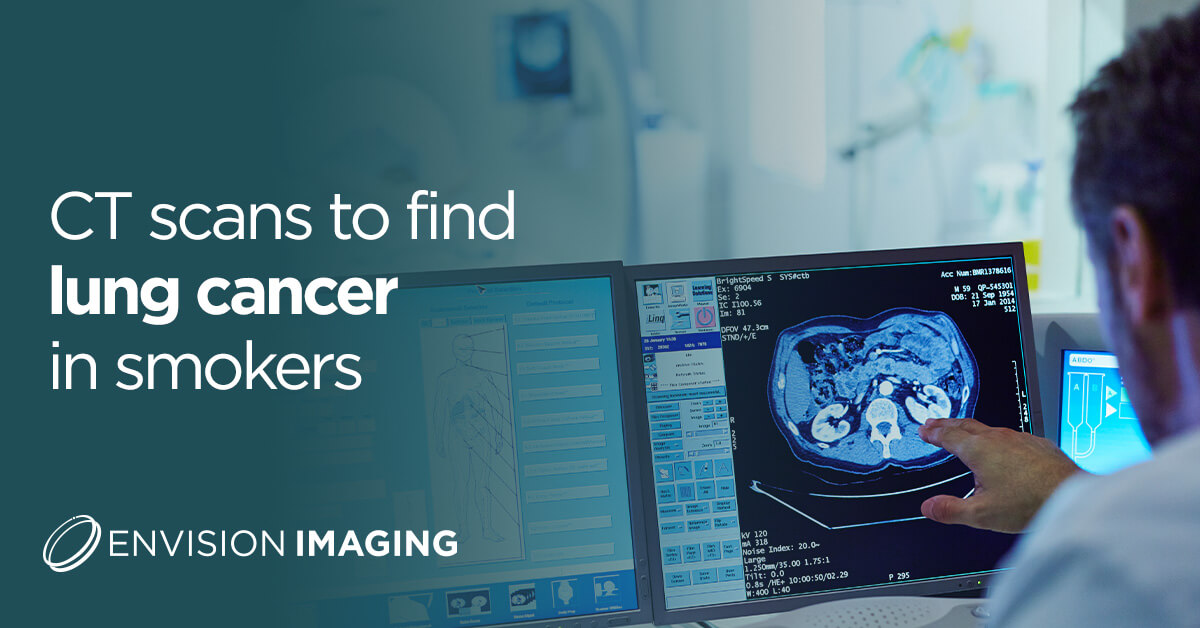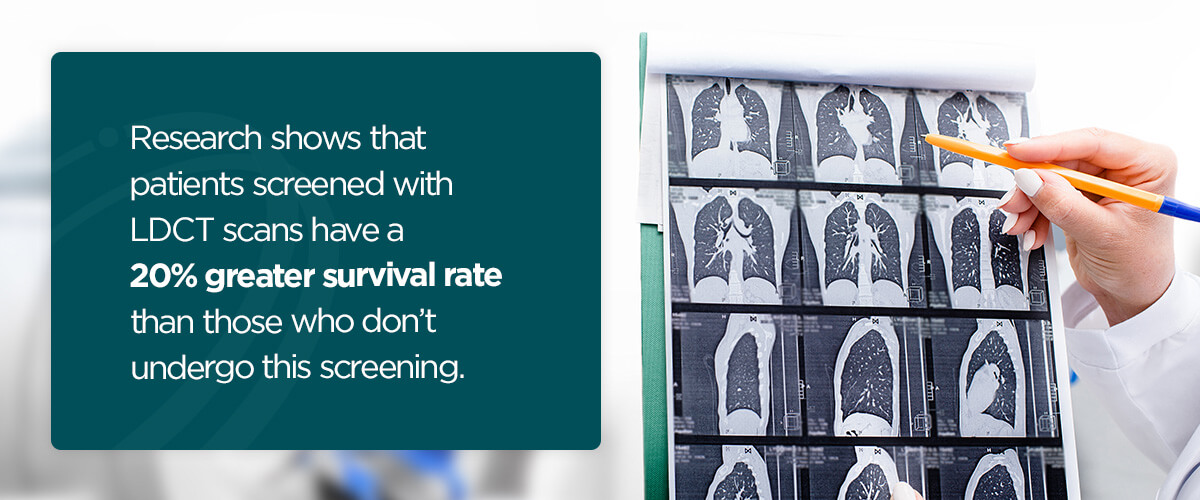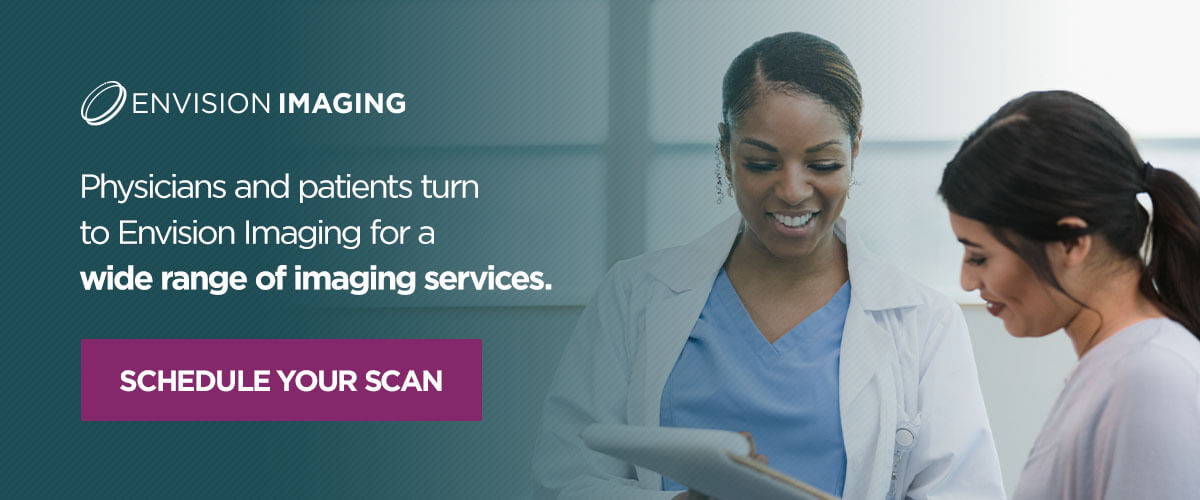Lung Cancer Screening

You likely know that smoking can damage your health in many ways. Smoking can lead to heart disease, diabetes, and, of course, lung cancer. Smokers are 15-30 times more likely to develop lung cancer or die from it than nonsmokers and lung cancer is the top cause of cancer death in the United States. Each year, lung cancer claims more lives than prostate, colon, and breast cancers combined.
Fortunately, new lung cancer cases are on the decline as people quit smoking, and fewer people today die from lung cancer thanks to early detection tests.
Early detection with CT scans
One reason lung cancer is so deadly is that many people don’t know they have it until it spreads and becomes severe. Lung cancer becomes much harder to treat once it progresses, so detecting it early can save lives.
Many tests are available to help detect lung cancer. A computed tomography (CT) scan is one tool that uses X-rays and a special computer to take detailed pictures of the inside of your body. CT scans for lung cancer can help find irregular areas in the lungs that may need further medical attention.
The key to successfully treating lung cancer is finding it early, and that’s where low-dose CT (LDCT) scans come in. These are CT scans for lung cancer that use low doses of radiation to detect abnormalities in the lungs. These doses are low enough that LDCT scans are safe for yearly screening of people at risk of lung cancer.
What is lung cancer screening?
Lung cancer screening is the process of detecting lung cancer on a CT scan before it causes symptoms in people at high risk. The earlier lung cancer gets treated, the better chance patients have of getting cured.
Lung cancer screening is recommended to be performed annually for those who are at higher risk of developing lung cancer.
Who should get lung cancer screening?
Doctors recommend low-dose CT scans for lung cancer in people who are vulnerable before they have symptoms. You may be a candidate for lung cancer screening if you:
- Are 50-80 years old AND
- Have a smoked history of at least 20 pack-years or one pack per day for at least 10 years — AND
- Current smoker, or have quit within the past 15 years ago
If you meet the guidelines above, you may be at high risk of lung cancer and qualify for yearly screening exams. If you think you may be eligible for a LDCT scan, please discuss it with your doctor.
How accurate are low-dose CT scans for lung cancer?
Research shows that patients screened with LDCT scans have a 20% greater survival rate than those who don’t undergo this screening. LDCT is much more accurate than a standard chest x-ray because it can catch small tumors at an earlier, more manageable stage.
What are the benefits of LDCT screening?
Getting screened greatly reduces the chance of dying from lung cancer. LDCT screening detects 80% of lung cancer at an early stage when it’s more treatable. Without screening, 70% of lung cancers are found at advanced stages when there’s typically little chance of successful treatment.
What are the risks of LDCT screening?
As with all screening tools, LDCT scans carry some risks that patients should be aware of, including the following:
Low radiation exposure
Because CT scans use radiation to produce images, lung cancer screening exposes you to a low amount of radiation — about the same as what an average American gets from the sun in six months. For context, this amount is slightly higher than the radiation women are exposed to during mammograms.
False positives
When physicians study LDCT scans, they may see things that look like cancer but aren’t, giving a false positive reading. False positives might lead you to undergo additional tests or treatment you wouldn’t have completed if you hadn’t had the screening.
False positives aren’t uncommon in lung cancer screenings, particularly in initial scans. However, as you continue to get screened yearly, false positives are less likely because doctors can compare each new scan to the last for changes. The rate of false positives in lung cancer screening is decreasing due to new technology that helps doctors decide who needs more testing and who doesn’t.
Incidental findings
CT scans produce images of body parts beyond the lungs. Sometimes, these images detect areas that may be medically concerning and require follow-up testing or treatment, known as incidental findings. Like false positives, the rate of incidental findings drops with continued annual screening scans.
What can you expect at an LDCT screening?
If you’re a candidate for lung cancer screening and would like to get a scan, your doctor will refer you for a low-dose CT scan. Your scan will be done at either a hospital or an imaging center. Your screening center will be in touch to let you know how to prepare for your scan.
At the time of your appointment, you’ll remove any jewelry and possibly change into medical scrubs or a hospital gown. You’ll lie on a table that slides in and out of the scanner, which looks like a large donut-shaped tunnel. Your technologist will move to a separate room with a window and will be able to talk with you using a two-way microphone during the scan. You’ll be told to remain still and hold your breath during the scanning, as movement during imaging may produce inconclusive results.
You can expect your appointment to take about 30 minutes, although the actual scan only lasts about a minute. After your screening, you can continue your day as usual. A board-certified Radiologist will read and review the CT images from your scan and provide results directly to your doctor. You can then schedule a follow-up visit with your doctor to discuss the scan results, and possible follow-up requirements and answer any questions.
Trust your health to Envision Imaging
Physicians and patients turn to Envision Imaging for a wide range of imaging services. We offer world-class diagnostic imaging, a caring and knowledgeable staff, and fast turnaround times. Starting the moment you reach out to us, you can expect that your health and well-being are our top priority.
We understand the circumstances that bring you to us may be confusing and scary. When you visit any of our convenient Envision Imaging locations, you can count on a warm, friendly experience and cutting-edge technology that gets you results fast.
Ask your provider about ordering a Lunch Cancer Screening with Envision Imaging today! Click here to find an Envision Imaging location nearest you.




